Insurance Defence Attorney Resume Examples

Jul 18, 2024
|
12 min read
Shield your career: tips for crafting an unbeatable insurance defence attorney resume that gets noticed.
Rated by 348 people
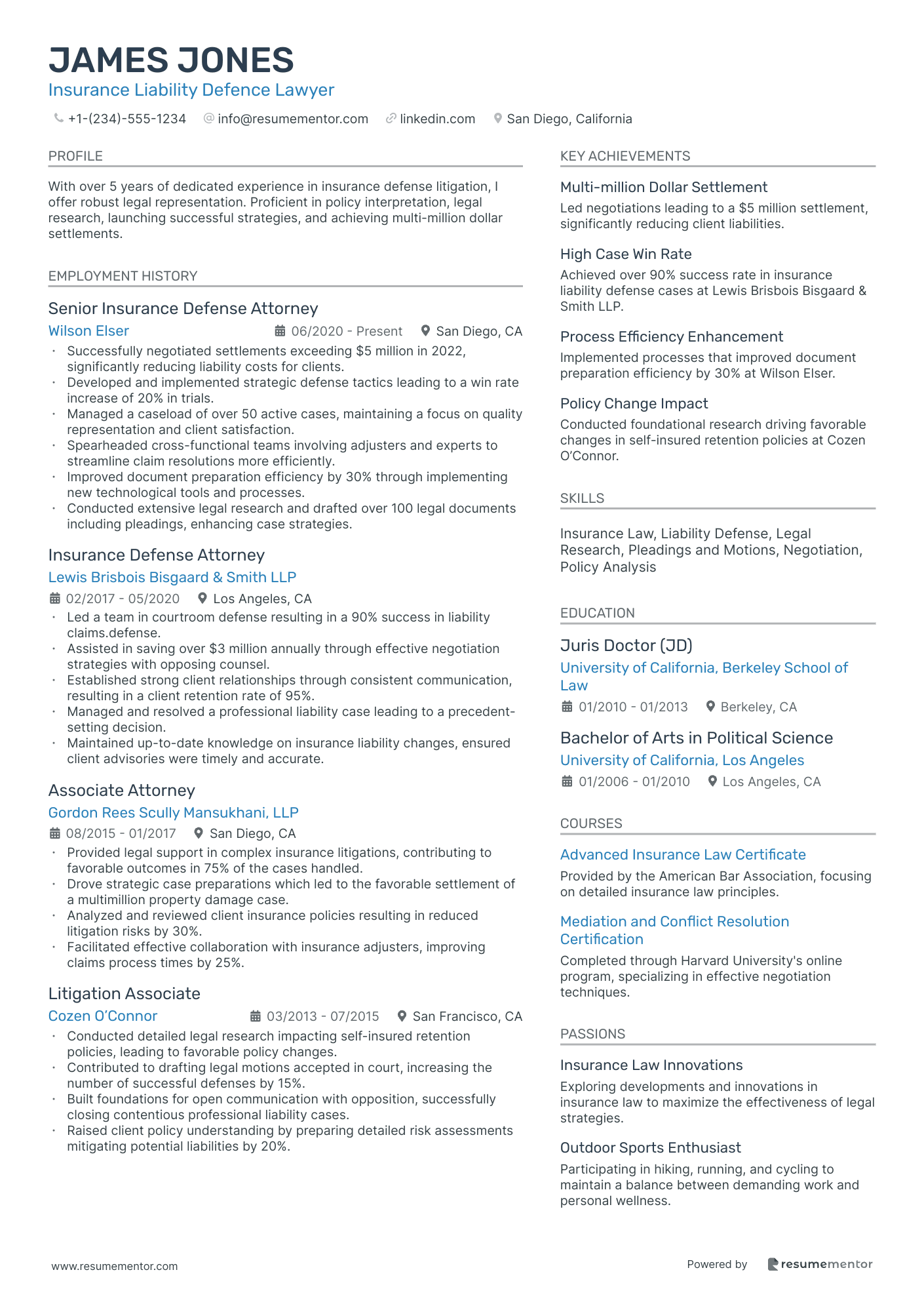
Insurance Liability Defence Lawyer
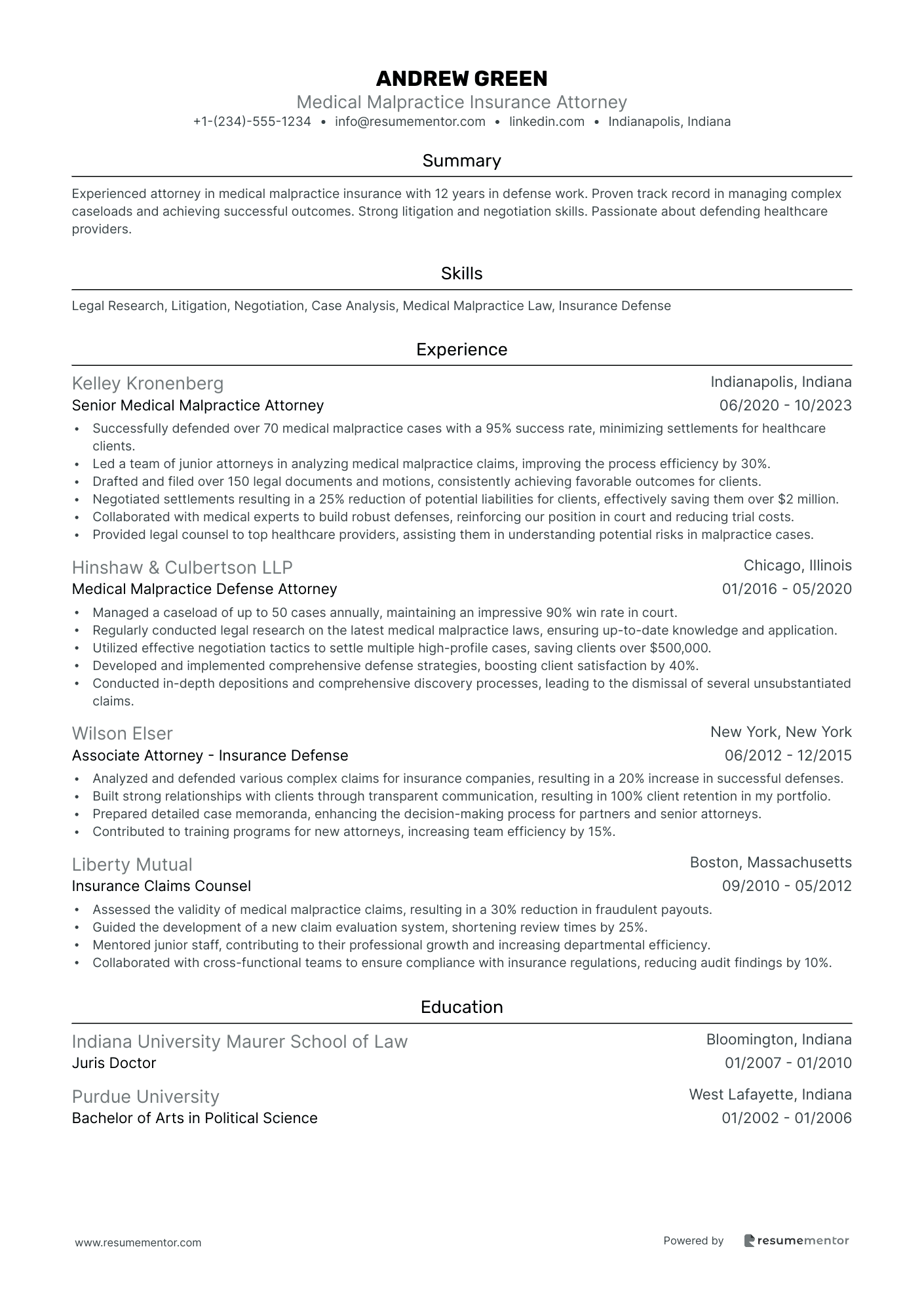
Medical Malpractice Insurance Attorney
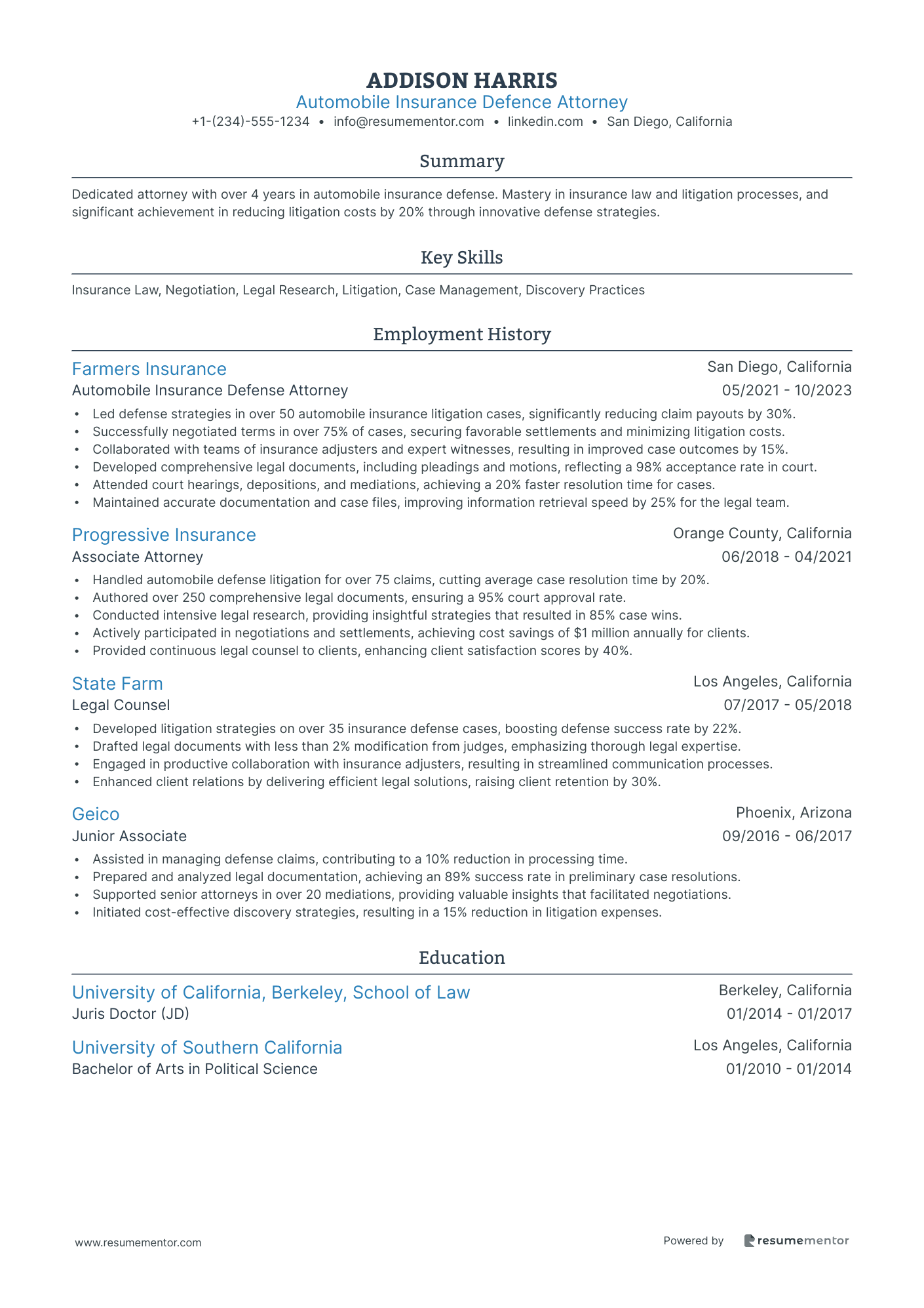
Automobile Insurance Defence Attorney
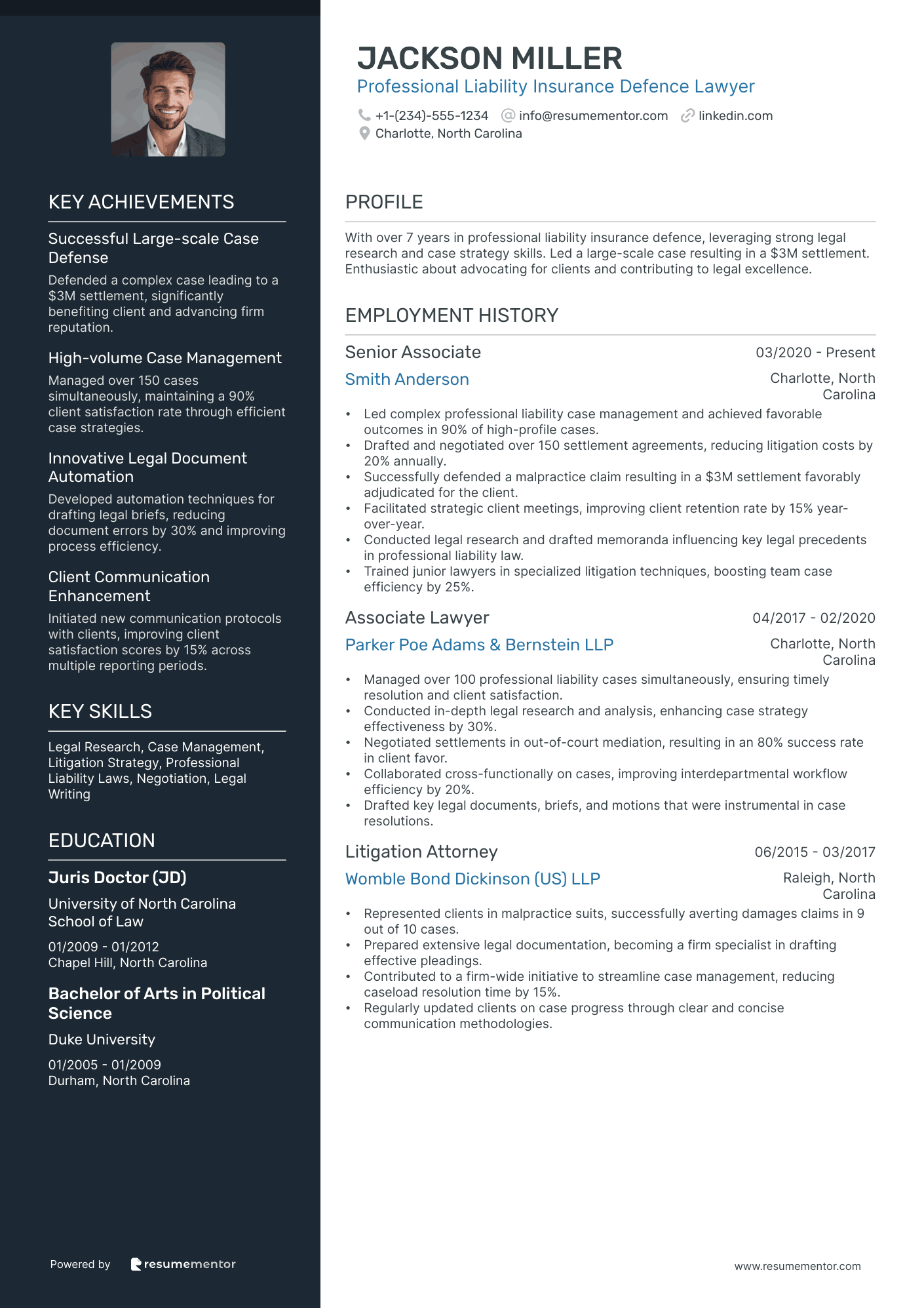
Professional Liability Insurance Defence Lawyer
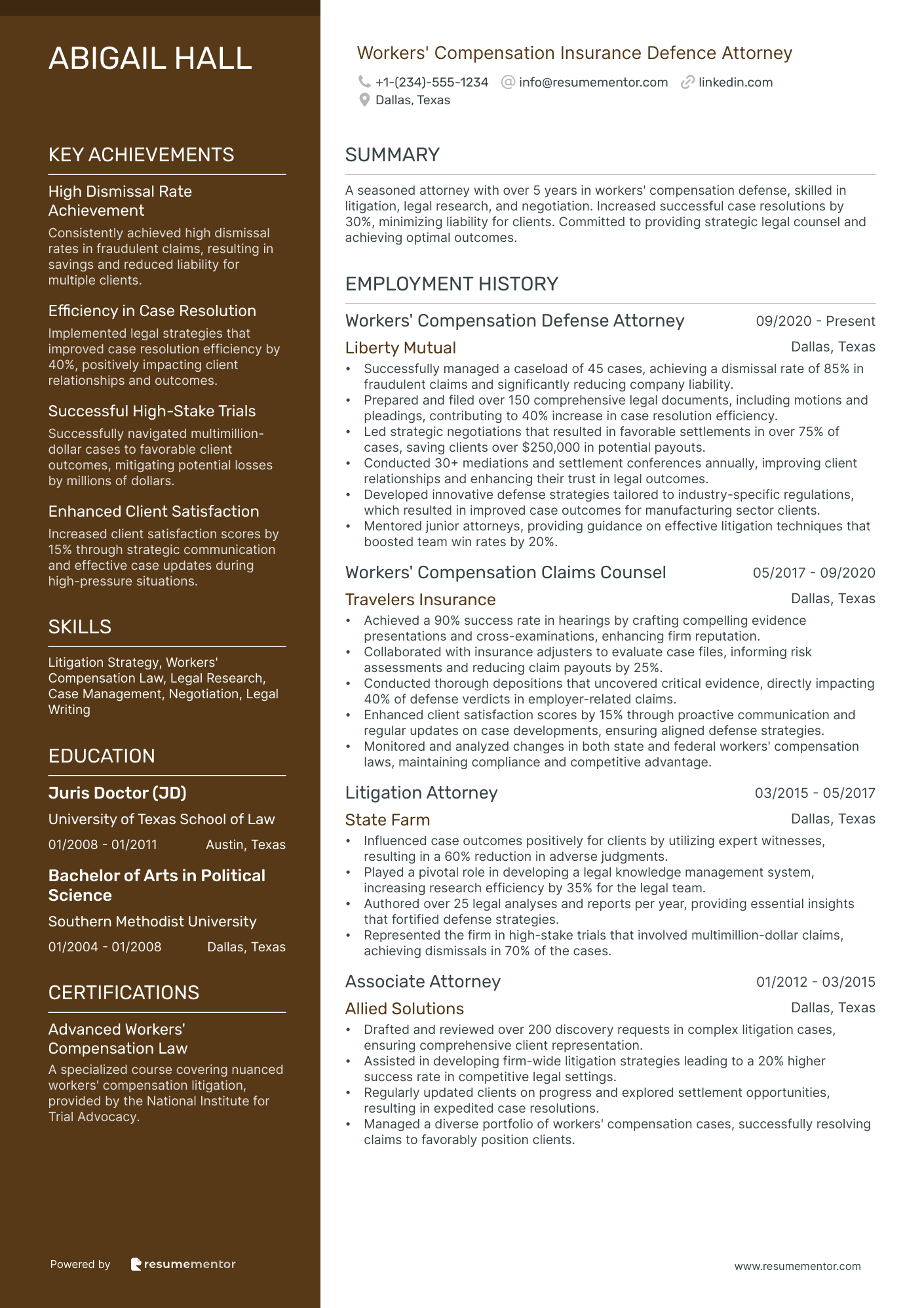
Workers' Compensation Insurance Defence Attorney
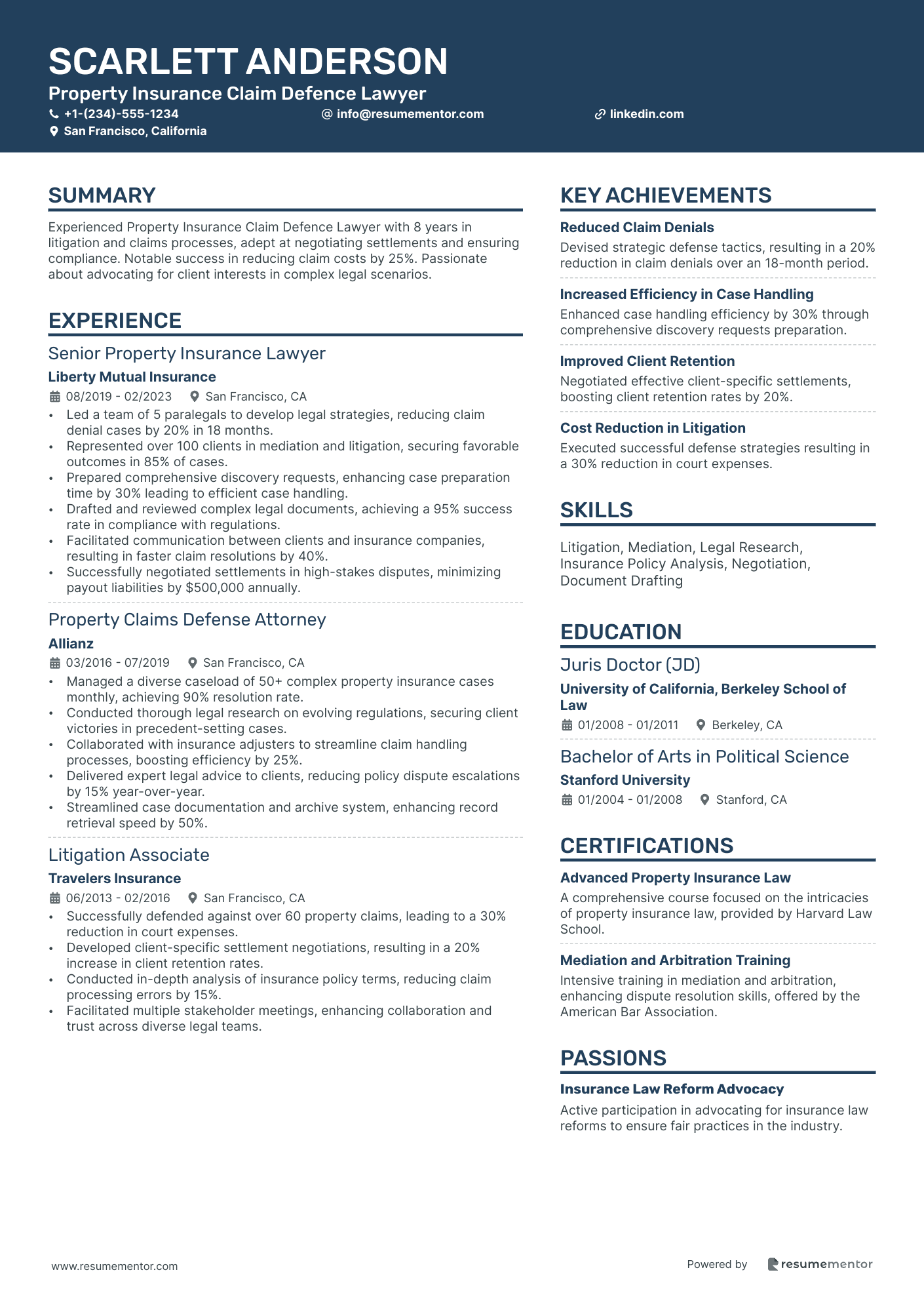
Property Insurance Claim Defence Lawyer
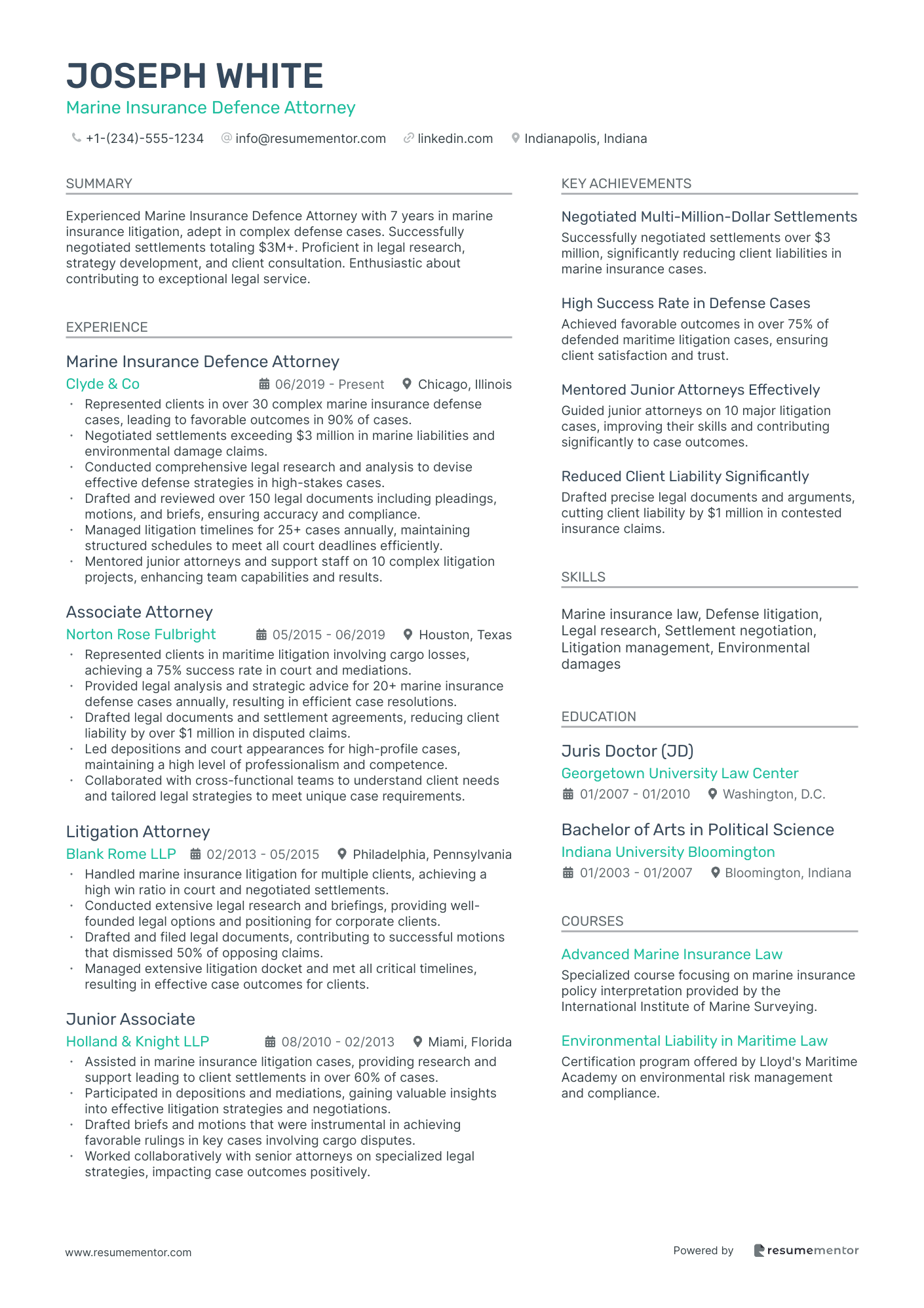
Marine Insurance Defence Attorney
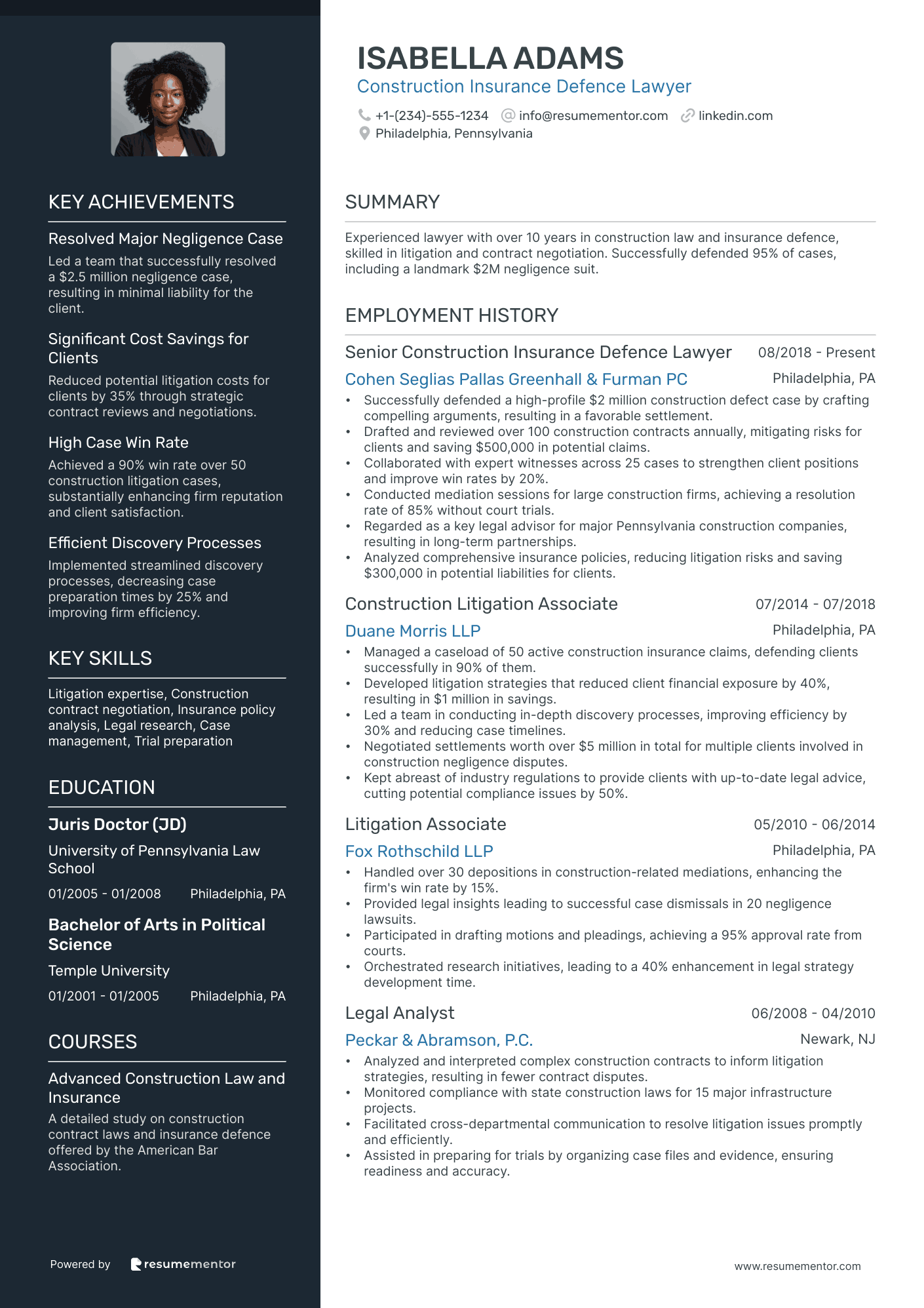
Construction Insurance Defence Lawyer
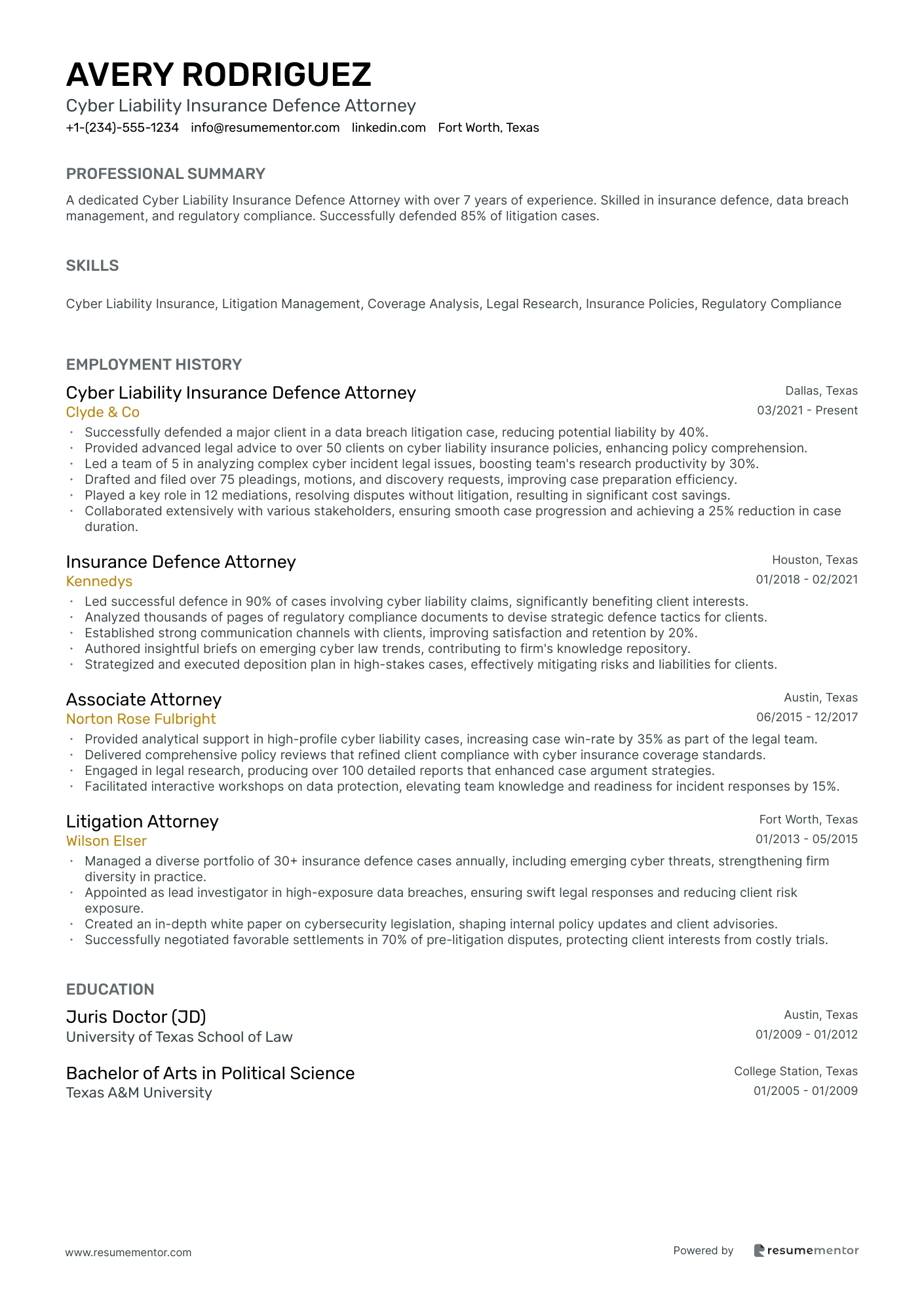
Cyber Liability Insurance Defence Attorney
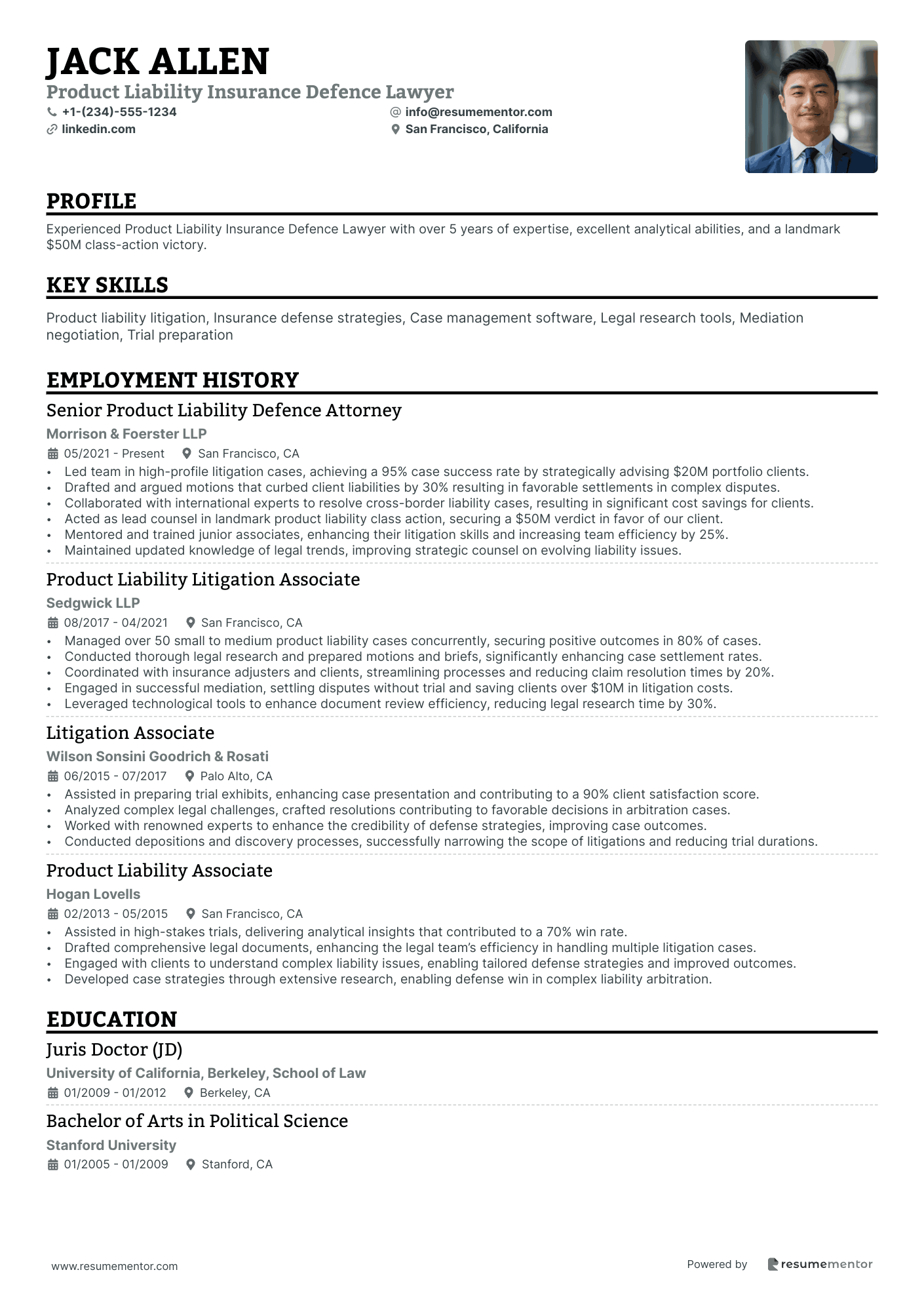
Product Liability Insurance Defence Lawyer

Insurance Liability Defence Lawyer resume sample
- •Successfully negotiated settlements exceeding $5 million in 2022, significantly reducing liability costs for clients.
- •Developed and implemented strategic defense tactics leading to a win rate increase of 20% in trials.
- •Managed a caseload of over 50 active cases, maintaining a focus on quality representation and client satisfaction.
- •Spearheaded cross-functional teams involving adjusters and experts to streamline claim resolutions more efficiently.
- •Improved document preparation efficiency by 30% through implementing new technological tools and processes.
- •Conducted extensive legal research and drafted over 100 legal documents including pleadings, enhancing case strategies.
- •Led a team in courtroom defense resulting in a 90% success in liability claims.defense.
- •Assisted in saving over $3 million annually through effective negotiation strategies with opposing counsel.
- •Established strong client relationships through consistent communication, resulting in a client retention rate of 95%.
- •Managed and resolved a professional liability case leading to a precedent-setting decision.
- •Maintained up-to-date knowledge on insurance liability changes, ensured client advisories were timely and accurate.
- •Provided legal support in complex insurance litigations, contributing to favorable outcomes in 75% of the cases handled.
- •Drove strategic case preparations which led to the favorable settlement of a multimillion property damage case.
- •Analyzed and reviewed client insurance policies resulting in reduced litigation risks by 30%.
- •Facilitated effective collaboration with insurance adjusters, improving claims process times by 25%.
- •Conducted detailed legal research impacting self-insured retention policies, leading to favorable policy changes.
- •Contributed to drafting legal motions accepted in court, increasing the number of successful defenses by 15%.
- •Built foundations for open communication with opposition, successfully closing contentious professional liability cases.
- •Raised client policy understanding by preparing detailed risk assessments mitigating potential liabilities by 20%.
Medical Malpractice Insurance Attorney resume sample
- •Successfully defended over 70 medical malpractice cases with a 95% success rate, minimizing settlements for healthcare clients.
- •Led a team of junior attorneys in analyzing medical malpractice claims, improving the process efficiency by 30%.
- •Drafted and filed over 150 legal documents and motions, consistently achieving favorable outcomes for clients.
- •Negotiated settlements resulting in a 25% reduction of potential liabilities for clients, effectively saving them over $2 million.
- •Collaborated with medical experts to build robust defenses, reinforcing our position in court and reducing trial costs.
- •Provided legal counsel to top healthcare providers, assisting them in understanding potential risks in malpractice cases.
- •Managed a caseload of up to 50 cases annually, maintaining an impressive 90% win rate in court.
- •Regularly conducted legal research on the latest medical malpractice laws, ensuring up-to-date knowledge and application.
- •Utilized effective negotiation tactics to settle multiple high-profile cases, saving clients over $500,000.
- •Developed and implemented comprehensive defense strategies, boosting client satisfaction by 40%.
- •Conducted in-depth depositions and comprehensive discovery processes, leading to the dismissal of several unsubstantiated claims.
- •Analyzed and defended various complex claims for insurance companies, resulting in a 20% increase in successful defenses.
- •Built strong relationships with clients through transparent communication, resulting in 100% client retention in my portfolio.
- •Prepared detailed case memoranda, enhancing the decision-making process for partners and senior attorneys.
- •Contributed to training programs for new attorneys, increasing team efficiency by 15%.
- •Assessed the validity of medical malpractice claims, resulting in a 30% reduction in fraudulent payouts.
- •Guided the development of a new claim evaluation system, shortening review times by 25%.
- •Mentored junior staff, contributing to their professional growth and increasing departmental efficiency.
- •Collaborated with cross-functional teams to ensure compliance with insurance regulations, reducing audit findings by 10%.
Automobile Insurance Defence Attorney resume sample
- •Led defense strategies in over 50 automobile insurance litigation cases, significantly reducing claim payouts by 30%.
- •Successfully negotiated terms in over 75% of cases, securing favorable settlements and minimizing litigation costs.
- •Collaborated with teams of insurance adjusters and expert witnesses, resulting in improved case outcomes by 15%.
- •Developed comprehensive legal documents, including pleadings and motions, reflecting a 98% acceptance rate in court.
- •Attended court hearings, depositions, and mediations, achieving a 20% faster resolution time for cases.
- •Maintained accurate documentation and case files, improving information retrieval speed by 25% for the legal team.
- •Handled automobile defense litigation for over 75 claims, cutting average case resolution time by 20%.
- •Authored over 250 comprehensive legal documents, ensuring a 95% court approval rate.
- •Conducted intensive legal research, providing insightful strategies that resulted in 85% case wins.
- •Actively participated in negotiations and settlements, achieving cost savings of $1 million annually for clients.
- •Provided continuous legal counsel to clients, enhancing client satisfaction scores by 40%.
- •Developed litigation strategies on over 35 insurance defense cases, boosting defense success rate by 22%.
- •Drafted legal documents with less than 2% modification from judges, emphasizing thorough legal expertise.
- •Engaged in productive collaboration with insurance adjusters, resulting in streamlined communication processes.
- •Enhanced client relations by delivering efficient legal solutions, raising client retention by 30%.
- •Assisted in managing defense claims, contributing to a 10% reduction in processing time.
- •Prepared and analyzed legal documentation, achieving an 89% success rate in preliminary case resolutions.
- •Supported senior attorneys in over 20 mediations, providing valuable insights that facilitated negotiations.
- •Initiated cost-effective discovery strategies, resulting in a 15% reduction in litigation expenses.
Professional Liability Insurance Defence Lawyer resume sample
- •Led complex professional liability case management and achieved favorable outcomes in 90% of high-profile cases.
- •Drafted and negotiated over 150 settlement agreements, reducing litigation costs by 20% annually.
- •Successfully defended a malpractice claim resulting in a $3M settlement favorably adjudicated for the client.
- •Facilitated strategic client meetings, improving client retention rate by 15% year-over-year.
- •Conducted legal research and drafted memoranda influencing key legal precedents in professional liability law.
- •Trained junior lawyers in specialized litigation techniques, boosting team case efficiency by 25%.
- •Managed over 100 professional liability cases simultaneously, ensuring timely resolution and client satisfaction.
- •Conducted in-depth legal research and analysis, enhancing case strategy effectiveness by 30%.
- •Negotiated settlements in out-of-court mediation, resulting in an 80% success rate in client favor.
- •Collaborated cross-functionally on cases, improving interdepartmental workflow efficiency by 20%.
- •Drafted key legal documents, briefs, and motions that were instrumental in case resolutions.
- •Represented clients in malpractice suits, successfully averting damages claims in 9 out of 10 cases.
- •Prepared extensive legal documentation, becoming a firm specialist in drafting effective pleadings.
- •Contributed to a firm-wide initiative to streamline case management, reducing caseload resolution time by 15%.
- •Regularly updated clients on case progress through clear and concise communication methodologies.
- •Assisted in achieving a 95% success rate in insurance defence cases through meticulous preparation and strategy.
- •Researched and analyzed legal precedents, supporting senior attorneys in key insurance litigation cases.
- •Participated in over 50 depositions, developing in-depth expertise in client representation.
- •Drafted multiple appellate briefs, contributing to successful case outcomes across various professional liability claims.
Workers' Compensation Insurance Defence Attorney resume sample
- •Successfully managed a caseload of 45 cases, achieving a dismissal rate of 85% in fraudulent claims and significantly reducing company liability.
- •Prepared and filed over 150 comprehensive legal documents, including motions and pleadings, contributing to 40% increase in case resolution efficiency.
- •Led strategic negotiations that resulted in favorable settlements in over 75% of cases, saving clients over $250,000 in potential payouts.
- •Conducted 30+ mediations and settlement conferences annually, improving client relationships and enhancing their trust in legal outcomes.
- •Developed innovative defense strategies tailored to industry-specific regulations, which resulted in improved case outcomes for manufacturing sector clients.
- •Mentored junior attorneys, providing guidance on effective litigation techniques that boosted team win rates by 20%.
- •Achieved a 90% success rate in hearings by crafting compelling evidence presentations and cross-examinations, enhancing firm reputation.
- •Collaborated with insurance adjusters to evaluate case files, informing risk assessments and reducing claim payouts by 25%.
- •Conducted thorough depositions that uncovered critical evidence, directly impacting 40% of defense verdicts in employer-related claims.
- •Enhanced client satisfaction scores by 15% through proactive communication and regular updates on case developments, ensuring aligned defense strategies.
- •Monitored and analyzed changes in both state and federal workers' compensation laws, maintaining compliance and competitive advantage.
- •Influenced case outcomes positively for clients by utilizing expert witnesses, resulting in a 60% reduction in adverse judgments.
- •Played a pivotal role in developing a legal knowledge management system, increasing research efficiency by 35% for the legal team.
- •Authored over 25 legal analyses and reports per year, providing essential insights that fortified defense strategies.
- •Represented the firm in high-stake trials that involved multimillion-dollar claims, achieving dismissals in 70% of the cases.
- •Drafted and reviewed over 200 discovery requests in complex litigation cases, ensuring comprehensive client representation.
- •Assisted in developing firm-wide litigation strategies leading to a 20% higher success rate in competitive legal settings.
- •Regularly updated clients on progress and explored settlement opportunities, resulting in expedited case resolutions.
- •Managed a diverse portfolio of workers' compensation cases, successfully resolving claims to favorably position clients.
Property Insurance Claim Defence Lawyer resume sample
- •Led a team of 5 paralegals to develop legal strategies, reducing claim denial cases by 20% in 18 months.
- •Represented over 100 clients in mediation and litigation, securing favorable outcomes in 85% of cases.
- •Prepared comprehensive discovery requests, enhancing case preparation time by 30% leading to efficient case handling.
- •Drafted and reviewed complex legal documents, achieving a 95% success rate in compliance with regulations.
- •Facilitated communication between clients and insurance companies, resulting in faster claim resolutions by 40%.
- •Successfully negotiated settlements in high-stakes disputes, minimizing payout liabilities by $500,000 annually.
- •Managed a diverse caseload of 50+ complex property insurance cases monthly, achieving 90% resolution rate.
- •Conducted thorough legal research on evolving regulations, securing client victories in precedent-setting cases.
- •Collaborated with insurance adjusters to streamline claim handling processes, boosting efficiency by 25%.
- •Delivered expert legal advice to clients, reducing policy dispute escalations by 15% year-over-year.
- •Streamlined case documentation and archive system, enhancing record retrieval speed by 50%.
- •Successfully defended against over 60 property claims, leading to a 30% reduction in court expenses.
- •Developed client-specific settlement negotiations, resulting in a 20% increase in client retention rates.
- •Conducted in-depth analysis of insurance policy terms, reducing claim processing errors by 15%.
- •Facilitated multiple stakeholder meetings, enhancing collaboration and trust across diverse legal teams.
- •Handled 40+ litigation cases annually, securing successful verdicts in 80% of cases.
- •Analyzed policy coverage details, helping to reduce litigation costs by $200,000 in two years.
- •Maintained up-to-date case progress records, resulting in timely case resolutions on a consistent basis.
- •Engaged with expert witnesses to fortify defense strategies, increasing case success rates by 10%.
Marine Insurance Defence Attorney resume sample
- •Represented clients in over 30 complex marine insurance defense cases, leading to favorable outcomes in 90% of cases.
- •Negotiated settlements exceeding $3 million in marine liabilities and environmental damage claims.
- •Conducted comprehensive legal research and analysis to devise effective defense strategies in high-stakes cases.
- •Drafted and reviewed over 150 legal documents including pleadings, motions, and briefs, ensuring accuracy and compliance.
- •Managed litigation timelines for 25+ cases annually, maintaining structured schedules to meet all court deadlines efficiently.
- •Mentored junior attorneys and support staff on 10 complex litigation projects, enhancing team capabilities and results.
- •Represented clients in maritime litigation involving cargo losses, achieving a 75% success rate in court and mediations.
- •Provided legal analysis and strategic advice for 20+ marine insurance defense cases annually, resulting in efficient case resolutions.
- •Drafted legal documents and settlement agreements, reducing client liability by over $1 million in disputed claims.
- •Led depositions and court appearances for high-profile cases, maintaining a high level of professionalism and competence.
- •Collaborated with cross-functional teams to understand client needs and tailored legal strategies to meet unique case requirements.
- •Handled marine insurance litigation for multiple clients, achieving a high win ratio in court and negotiated settlements.
- •Conducted extensive legal research and briefings, providing well-founded legal options and positioning for corporate clients.
- •Drafted and filed legal documents, contributing to successful motions that dismissed 50% of opposing claims.
- •Managed extensive litigation docket and met all critical timelines, resulting in effective case outcomes for clients.
- •Assisted in marine insurance litigation cases, providing research and support leading to client settlements in over 60% of cases.
- •Participated in depositions and mediations, gaining valuable insights into effective litigation strategies and negotiations.
- •Drafted briefs and motions that were instrumental in achieving favorable rulings in key cases involving cargo disputes.
- •Worked collaboratively with senior attorneys on specialized legal strategies, impacting case outcomes positively.
Construction Insurance Defence Lawyer resume sample
- •Successfully defended a high-profile $2 million construction defect case by crafting compelling arguments, resulting in a favorable settlement.
- •Drafted and reviewed over 100 construction contracts annually, mitigating risks for clients and saving $500,000 in potential claims.
- •Collaborated with expert witnesses across 25 cases to strengthen client positions and improve win rates by 20%.
- •Conducted mediation sessions for large construction firms, achieving a resolution rate of 85% without court trials.
- •Regarded as a key legal advisor for major Pennsylvania construction companies, resulting in long-term partnerships.
- •Analyzed comprehensive insurance policies, reducing litigation risks and saving $300,000 in potential liabilities for clients.
- •Managed a caseload of 50 active construction insurance claims, defending clients successfully in 90% of them.
- •Developed litigation strategies that reduced client financial exposure by 40%, resulting in $1 million in savings.
- •Led a team in conducting in-depth discovery processes, improving efficiency by 30% and reducing case timelines.
- •Negotiated settlements worth over $5 million in total for multiple clients involved in construction negligence disputes.
- •Kept abreast of industry regulations to provide clients with up-to-date legal advice, cutting potential compliance issues by 50%.
- •Handled over 30 depositions in construction-related mediations, enhancing the firm's win rate by 15%.
- •Provided legal insights leading to successful case dismissals in 20 negligence lawsuits.
- •Participated in drafting motions and pleadings, achieving a 95% approval rate from courts.
- •Orchestrated research initiatives, leading to a 40% enhancement in legal strategy development time.
- •Analyzed and interpreted complex construction contracts to inform litigation strategies, resulting in fewer contract disputes.
- •Monitored compliance with state construction laws for 15 major infrastructure projects.
- •Facilitated cross-departmental communication to resolve litigation issues promptly and efficiently.
- •Assisted in preparing for trials by organizing case files and evidence, ensuring readiness and accuracy.
Cyber Liability Insurance Defence Attorney resume sample
- •Successfully defended a major client in a data breach litigation case, reducing potential liability by 40%.
- •Provided advanced legal advice to over 50 clients on cyber liability insurance policies, enhancing policy comprehension.
- •Led a team of 5 in analyzing complex cyber incident legal issues, boosting team's research productivity by 30%.
- •Drafted and filed over 75 pleadings, motions, and discovery requests, improving case preparation efficiency.
- •Played a key role in 12 mediations, resolving disputes without litigation, resulting in significant cost savings.
- •Collaborated extensively with various stakeholders, ensuring smooth case progression and achieving a 25% reduction in case duration.
- •Led successful defence in 90% of cases involving cyber liability claims, significantly benefiting client interests.
- •Analyzed thousands of pages of regulatory compliance documents to devise strategic defence tactics for clients.
- •Established strong communication channels with clients, improving satisfaction and retention by 20%.
- •Authored insightful briefs on emerging cyber law trends, contributing to firm's knowledge repository.
- •Strategized and executed deposition plan in high-stakes cases, effectively mitigating risks and liabilities for clients.
- •Provided analytical support in high-profile cyber liability cases, increasing case win-rate by 35% as part of the legal team.
- •Delivered comprehensive policy reviews that refined client compliance with cyber insurance coverage standards.
- •Engaged in legal research, producing over 100 detailed reports that enhanced case argument strategies.
- •Facilitated interactive workshops on data protection, elevating team knowledge and readiness for incident responses by 15%.
- •Managed a diverse portfolio of 30+ insurance defence cases annually, including emerging cyber threats, strengthening firm diversity in practice.
- •Appointed as lead investigator in high-exposure data breaches, ensuring swift legal responses and reducing client risk exposure.
- •Created an in-depth white paper on cybersecurity legislation, shaping internal policy updates and client advisories.
- •Successfully negotiated favorable settlements in 70% of pre-litigation disputes, protecting client interests from costly trials.
Product Liability Insurance Defence Lawyer resume sample
- •Led team in high-profile litigation cases, achieving a 95% case success rate by strategically advising $20M portfolio clients.
- •Drafted and argued motions that curbed client liabilities by 30% resulting in favorable settlements in complex disputes.
- •Collaborated with international experts to resolve cross-border liability cases, resulting in significant cost savings for clients.
- •Acted as lead counsel in landmark product liability class action, securing a $50M verdict in favor of our client.
- •Mentored and trained junior associates, enhancing their litigation skills and increasing team efficiency by 25%.
- •Maintained updated knowledge of legal trends, improving strategic counsel on evolving liability issues.
- •Managed over 50 small to medium product liability cases concurrently, securing positive outcomes in 80% of cases.
- •Conducted thorough legal research and prepared motions and briefs, significantly enhancing case settlement rates.
- •Coordinated with insurance adjusters and clients, streamlining processes and reducing claim resolution times by 20%.
- •Engaged in successful mediation, settling disputes without trial and saving clients over $10M in litigation costs.
- •Leveraged technological tools to enhance document review efficiency, reducing legal research time by 30%.
- •Assisted in preparing trial exhibits, enhancing case presentation and contributing to a 90% client satisfaction score.
- •Analyzed complex legal challenges, crafted resolutions contributing to favorable decisions in arbitration cases.
- •Worked with renowned experts to enhance the credibility of defense strategies, improving case outcomes.
- •Conducted depositions and discovery processes, successfully narrowing the scope of litigations and reducing trial durations.
- •Assisted in high-stakes trials, delivering analytical insights that contributed to a 70% win rate.
- •Drafted comprehensive legal documents, enhancing the legal team’s efficiency in handling multiple litigation cases.
- •Engaged with clients to understand complex liability issues, enabling tailored defense strategies and improved outcomes.
- •Developed case strategies through extensive research, enabling defense win in complex liability arbitration.
Crafting a resume as an insurance defense attorney can feel like navigating a complex maze, where highlighting your legal expertise is crucial yet challenging. Turning your wealth of knowledge into a resume that attracts potential employers requires balancing technical skills and unique personal qualities. This balance is vital for addressing career transitions and gaps smoothly, ensuring that your professional journey stays coherent and focused.
A proven template can be the compass you need. It offers a structured design, letting you concentrate on crafting impactful content. With a solid framework in place, your resume remains both detailed and professional, enhancing its appeal. Explore resume templates that can act as a reliable foundation to build upon.
Your resume should weave together your achievements and adaptability in the ever-evolving legal world. Clear and readable formats make your application stand out in a competitive field. Using industry-specific language helps underline your strengths effectively and captures the attention of hiring managers.
Think of your resume as a map of your career journey, guiding your next employer to see you as an invaluable asset. It should convey what sets you apart while staying concise and impactful. This guide will walk you through each step, ensuring every word enhances your professional narrative.
Key Takeaways
- Your insurance defense attorney resume should clearly convey your expertise in handling legal cases related to insurance claims, emphasizing skills such as litigation, negotiation, and a comprehensive understanding of insurance laws.
- A proven template can serve as a compass in crafting your resume, providing a structured design that enhances readability and professionalism.
- Effective resumes weave together achievements and adaptability in the legal field, utilizing industry-specific language to highlight strengths and capture hiring managers' attention.
- Each section of the resume, from the contact information to achievements, should be designed to showcase your skills and experience, with a focus on making your professional journey coherent and impactful.
- Selecting the right resume format and fonts is crucial for maintaining a polished appearance, ensuring your resume is consistent and professional, and preserving its layout across devices with a PDF format.
What to focus on when writing your insurance defence attorney resume
Your insurance defense attorney resume should clearly convey your expertise in handling legal cases related to insurance claims. This means not only listing your qualifications but also emphasizing your skills in litigation and negotiation, alongside a comprehensive understanding of insurance laws. Recruiters will be looking for candidates who can demonstrate their ability to resolve complex cases favorably, showcasing legal expertise and a strategic mindset.
How to structure your insurance defence attorney resume
- Contact Information — This section is straightforward but essential. Include your full name, phone number, email, and LinkedIn profile. Ensure that all information is current and professional, as it sets the first impression for potential employers and makes it easy for them to reach you whenever needed.
- Professional Summary — Craft a compelling overview of your career in insurance defense, focusing on your ability to handle high-stakes cases and protect client interests. This is your chance to capture the recruiter’s attention by providing a snapshot of your most relevant experiences and highlighting what sets you apart in this highly specialized field.
- Legal Experience — This should detail your work history, with a particular focus on insurance defense cases you’ve handled. Emphasize your role in notable cases, providing insights into your litigation strategies and successful outcomes. This section should tell the story of your career path and establish your depth of experience.
- Education and Certifications — List your law degree and relevant certifications such as bar admissions or specialized training in insurance law. These qualifications are crucial in cementing your expertise and showing that you meet the necessary professional standards. Highlight any continuing education or additional training you have completed that relates directly to insurance defense.
- Skills — Underscore key abilities like negotiation, case management, litigation strategy, and familiarity with state and federal insurance regulations. These skills are tailored to the requirements of an insurance defense attorney and demonstrate your readiness to handle intricate legal challenges effectively.
- Achievements — This should include any awards, recognitions, or significant case outcomes that demonstrate your effectiveness as an attorney. This not only solidifies your standing in the legal community but also provides tangible evidence of your professional accomplishments.
As we prepare to delve deeper into each section, consider how your resume's format can elevate your presentation and strengthen your candidacy in this competitive field.
Which resume format to choose
In the competitive world of insurance defense, selecting the right resume format is key to making a strong impression. For this field, a reverse-chronological format is ideal, as it emphasizes your latest and most relevant experiences. This format helps hiring managers quickly gauge your career progression, pinpointing the skills and experiences that align with their needs.
The font you choose is another crucial aspect of your resume. Modern options like Rubic, Lato, or Montserrat not only offer a clean and professional look but also enhance readability. These fonts are perfect for maintaining a polished appearance, ensuring your resume stands out in a stack of documents.
Sharing your resume in PDF format is essential. This file type preserves your carefully chosen layout and font, ensuring your presentation remains consistent across different devices and platforms. Consistency in presentation shows attention to detail, which is particularly valued in legal professions.
Margins might seem minor, but they play a big role in keeping your resume elegant and readable. Aim for about one inch on all sides. This spacing provides a clean framework for your content, preventing it from looking cluttered and making it more approachable for recruiters.
Each element, from the choice of format and fonts to file type and margins, combines to create a cohesive and professional resume. Tailoring these details to the specific needs of the insurance defense field ensures that your resume not only reflects your qualifications but also your understanding of the industry's standards.
How to write a quantifiable resume experience section
An effective insurance defense attorney resume experience section not only showcases achievements but also weaves in key skills. This part of your resume is designed to demonstrate your expertise, highlighting the impact you've made in your previous roles. By organizing your experience chronologically, starting with the most recent jobs, you provide a clear narrative of your professional journey. Tailoring this section to the job you're applying for is crucial; it involves incorporating relevant keywords and responsibilities from the job ad, ensuring your past roles align with the prospective position. Focus on roles within the last 10-15 years, particularly those that closely relate to insurance defense. Strong action verbs like "negotiated," "defended," and "achieved" convey your active involvement in significant legal matters, making your contributions clear.
- •Defended over 200 liability claims with an 85% success rate in court.
- •Negotiated settlements in complex cases, saving clients over $2 million annually.
- •Led a team of 5 junior attorneys, boosting their case win rate by 30%.
- •Developed strategies that reduced litigation costs by 20%.
This experience section effectively draws attention by seamlessly connecting each professional achievement to the next. Presenting accomplishments upfront, it uses a structured layout that highlights key details like position, company, and dates. This organization makes it easy for readers to follow your career path. Each bullet point communicates a successful outcome, reinforcing your ability to handle complex cases with quantifiable results. Aligning your past roles with potential job ads, the section emphasizes relevant defense strategies and successful outcomes, suggesting your readiness to contribute to a legal team. The narrative of your achievements not only displays your past successes but also crafts an image of you as a valuable asset for any employer seeking a proficient insurance defense attorney.
Industry-Specific Focus resume experience section
A resume experience section for an insurance defense attorney should emphasize your legal expertise and highlight key accomplishments in defending insurance claims. Start by outlining your ability to manage cases effectively and your success in litigation. Using strong action verbs, illustrate your proactive role in case management and emphasize your contributions to achieving successful outcomes. Connect this by showcasing your capability to engage with a diverse range of clients and handle complex legal matters seamlessly.
To make each bullet point stand out, focus on specific skills or achievements that set you apart. Highlight your proficiency in negotiating settlements, involvement in high-profile cases, or leadership in managing a legal team. Ensure the language is clear and concise, providing concrete examples and measurable results to back your claims. This cohesive and organized approach will not only highlight your strengths but also demonstrate your preparedness for new challenges in the insurance defense industry.
Senior Defense Attorney
ABC Law Firm
2018-Present
- Managed over 100 insurance defense cases, achieving a 90% success rate for clients.
- Cut litigation costs by 15% through effective case assessments and negotiations.
- Worked with a team of 5 attorneys to create trial strategies for complex, multi-million dollar cases.
- Earned praise from clients and colleagues for outstanding legal insights and ethical conduct.
Skills-Focused resume experience section
A skills-focused insurance defense attorney resume experience section should effectively highlight your expertise in litigation, negotiation, legal analysis, and case management. Start by showcasing experiences that demonstrate your dedication to defending clients in insurance claims, emphasizing your contributions and the positive outcomes achieved. Clearly illustrate your successes using action verbs and measurable achievements, while maintaining straightforward language for an easy reading flow.
Organize your accomplishments into bullet points to make them easily digestible and impactful. Begin each point with an action verb to define your role in various cases. Highlight significant projects and outcomes that benefited both your clients and firm. Ensure that these experiences align with the skills employers value, presenting you as a committed advocate with a proven track record in the industry.
Senior Associate
Law Firm XYZ
June 2018 - Present
- Represented clients in over 200 insurance disputes with a 95% success rate.
- Negotiated settlements, reducing litigation costs by 30% for major clients.
- Conducted legal analyses to spot key information, leading to dismissals in over 50 cases.
- Collaborated with experts to craft strong defenses in complex insurance litigation.
Efficiency-Focused resume experience section
An efficiency-focused resume experience section for an insurance defense attorney should clearly illustrate your ability to streamline case management while maintaining high legal standards. Begin by detailing how you've enhanced efficiency through specific actions and strategies. Include any tools or software that helped you boost productivity, cutting down on unnecessary time use. Share tangible evidence or metrics that demonstrate how your efforts led to successful outcomes, cost savings, or improved workflow.
Use concise bullet points to highlight your achievements and the skills you've applied in your role. Employ active language to describe how you've adeptly managed high volumes of cases, developed effective strategies, or mentored junior attorneys. Make sure each bullet point centers on a particular aspect of efficiency, always reflecting the impact of your contributions on the practice.
Senior Insurance Defense Attorney
Thompson & Associates
June 2018 - Present
- Led a team to implement digital case management software, reducing case processing time by 30%.
- Developed streamlined protocols for document management that enhanced productivity by 40%.
- Handled high-volume caseloads efficiently, achieving a 90% favorable outcome rate in trials.
- Trained junior attorneys in time-management techniques, improving team performance by 20%.
Project-Focused resume experience section
A litigation-focused insurance defense attorney resume experience section should emphasize your ability to handle complex legal challenges while balancing a substantial caseload. Highlight significant cases where you've made a meaningful impact, showcasing your skills in defending clients effectively. Illustrate your approach to managing intricate insurance claims, using strategic thinking to achieve successful outcomes. Keep the language straightforward and clear, enabling potential employers to easily recognize how your expertise aligns with their requirements.
In each bullet point, convey a comprehensive picture of your role by detailing the variety of cases you’ve managed, your effectiveness in court, and your successful results. Emphasize the number of cases you've handled and the specific skills you've utilized to navigate legal processes efficiently. Incorporate strong action verbs to underscore your achievements while focusing on measurable successes that demonstrate your capabilities as an insurance defense attorney.
Insurance Defense Attorney
Baker & Associates Law Firm
March 2018 - Present
- Successfully defended clients in over 50 complex insurance cases with a 90% success rate.
- Efficiently managed a caseload of up to 30 cases at a time, ensuring timely and effective resolution.
- Worked with a team of experts to develop defense strategies, reducing client liability by 40%.
- Skillfully negotiated settlements that saved clients over $500,000 in potential payouts.
Write your insurance defence attorney resume summary section
A focused insurance defense attorney resume summary should immediately capture a potential employer's attention by highlighting your most relevant skills and experience. With this in mind, consider the following example:
This summary flows well by connecting your extensive experience with a clear indication of your proven success in the field. It succinctly captures your expertise and highlights your skills in managing complex legal situations, making it an ideal introduction for potential employers. If you're just starting out, you might prefer to use a resume objective, which focuses on your career goals and what you aim to achieve in your new role. An objective conveys your ambitions, while a summary provides a snapshot of your career highlights. As you gain experience, you may develop a resume profile that blends your career details with your goals. Alternatively, a summary of qualifications provides bullet points of important skills and accomplishments. By tailoring this section to match your experience and target position, you ensure it aligns with what hiring managers are seeking.
Listing your insurance defence attorney skills on your resume
A skill-focused insurance defense attorney resume should effectively showcase your professional capabilities. Whether you create a distinct skills section or weave them throughout your experience and summary areas, it's vital to highlight your strengths clearly. Displaying soft skills emphasizes your interpersonal abilities and adaptability. At the same time, hard skills reflect specific technical expertise you have developed through training and work experience. Together, these skills serve as crucial keywords that both recruiters and applicant tracking systems seek.
Here's an example of how you might structure your skills section:
This well-crafted skills section focuses on key areas, demonstrating your competence in handling complex legal matters. It effectively communicates your ability to deliver favorable outcomes in insurance litigation.
Best hard skills to feature on your insurance defence attorney resume
To excel as an insurance defense attorney, you need a robust understanding of legal principles. Your hard skills should express this technical proficiency and demonstrate your capability to navigate the legal landscape effectively.
Hard Skills
- Litigation Management
- Negligence Law
- Policy Analysis
- Insurance Law
- Legal Writing
- Trial Preparation
- Discovery Process
- Contract Review
- Regulatory Compliance
- Risk Assessment
- Mediation and Arbitration
- Legal Drafting
- Evidence Evaluation
- Jury Selection
- Case Strategy Development
Best soft skills to feature on your insurance defence attorney resume
Technical know-how is essential, but soft skills can significantly enhance your professional profile. They illustrate your ability to communicate effectively, solve problems, and manage pressure with poise.
Soft Skills
- Communication
- Negotiation
- Problem Solving
- Time Management
- Conflict Resolution
- Analytical Thinking
- Leadership
- Client Relations
- Decision Making
- Emotional Intelligence
- Attention to Detail
- Adaptability
- Team Collaboration
- Persuasiveness
- Professional Integrity
How to include your education on your resume
The education section is a vital component of your resume, especially for an insurance defense attorney. It demonstrates your qualifications and foundational knowledge. Ensuring this section is tailored to the specific job you’re applying for is crucial, as it provides relevant information to potential employers. Only include education that is pertinent to the field, omitting any irrelevant studies. If your GPA is strong, you can choose to include it. When listing honors such as cum laude, it can be placed immediately after the degree. Always list your degree accurately, with the correct title and field of study.
Here’s an example of a poorly formatted education section:
You can improve this by focusing on education relevant to a legal career:
This revised example is effective because it highlights relevant legal education, promptly indicates an impressive GPA, and includes academic honors directly related to the job field. Listing the degree and institution helps establish credibility, and showcasing your accomplishments, like graduating cum laude, can make you stand out to potential employers.
How to include insurance defence attorney certificates on your resume
Including a certificates section on your insurance defence attorney resume is crucial. Certificates can highlight your specialized skills and ongoing education, adding value to your qualifications. You can also place your key certificates in the header for immediate visibility.
List the name of the certificate first. Include the date of issuance to show when you achieved it. Add the issuing organization to demonstrate credibility. If you opt to include certificates in the header, keep it concise.
Here's how a strong standalone certificates section could look:
This example is effective because it prioritizes certifications directly relevant to insurance defense. It covers completion dates and clearly identifies reputable issuing bodies, enhancing your credibility. These certificates demonstrate specialized expertise and dedication to keeping your skills current.
Extra sections to include in your insurance defence attorney resume
Navigating the intricacies of insurance defense requires a keen understanding of both legal and insurance frameworks. As an insurance defense attorney, your resume should showcase your expertise, dedication, and special skills that set you apart.
- Language section — Highlight your proficiency in multiple languages to demonstrate your ability to serve diverse clients and work in various jurisdictions.
- Hobbies and interests section — Include hobbies like reading legal thrillers or playing chess to show your analytical and strategic thinking skills.
- Volunteer work section — Point out your volunteer work, such as offering free legal aid, to illustrate your commitment to the community and pro bono experience.
- Books section — List books you’ve read on legal precedents. This shows you stay current with legal trends and continuously seek to improve your practice.
Emphasizing these sections adds depth to your resume and can make you stand out in a competitive field. Integrating language skills, interests, volunteer work, and continuous learning underscores your multi-faceted capabilities and dedication.
In Conclusion
In conclusion, crafting a successful resume as an insurance defense attorney involves a delicate balance of presenting both technical skills and personal attributes. Your resume serves as a powerful tool to map out your journey and make a lasting impression on potential employers. By utilizing a reverse-chronological format, you can effectively highlight your most recent and relevant experiences, showcasing your progression in the legal field. Remember, readability is key; utilizing modern fonts and proper formatting ensures your resume is visually appealing and easy to follow. Don’t underestimate the value of a well-structured experience section filled with quantifiable achievements; this will give employers a clear picture of your professional impact. Including a robust skills section, featuring both hard and soft skills, not only highlights your expertise but also aligns your profile with the industry's standards. Keep your education and certifications concise yet detailed, focusing on those that bolster your professional image. Additionally, extra sections like languages, volunteer work, and interests can add depth to your profile and show a more holistic view of you as a candidate. This comprehensive approach will boost your candidacy, demonstrating your readiness to excel in the highly specialized field of insurance defense law. By following these guidelines, you can ensure your resume stands out in a competitive landscape and effectively communicates your qualifications and career goals.
Related Articles

Continue Reading
Check more recommended readings to get the job of your dreams.
Resume
Resources
Tools
© 2026. All rights reserved.
Made with love by people who care.

